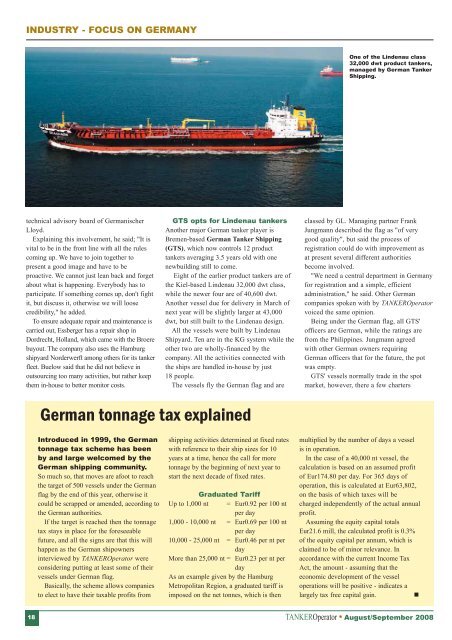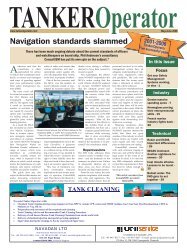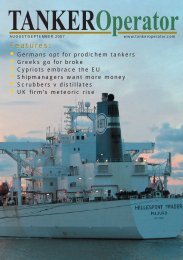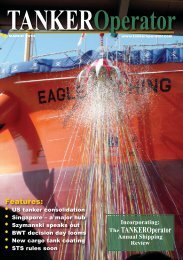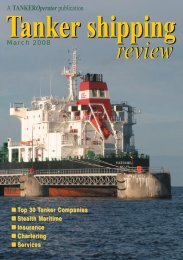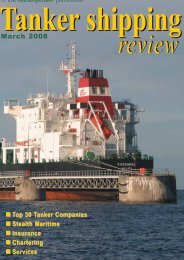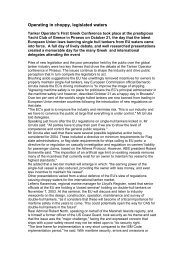Features: - Tanker Operator
Features: - Tanker Operator
Features: - Tanker Operator
You also want an ePaper? Increase the reach of your titles
YUMPU automatically turns print PDFs into web optimized ePapers that Google loves.
INDUSTRY - FOCUS ON GERMANY<br />
technical advisory board of Germanischer<br />
Lloyd.<br />
Explaining this involvement, he said; "It is<br />
vital to be in the front line with all the rules<br />
coming up. We have to join together to<br />
present a good image and have to be<br />
proactive. We cannot just lean back and forget<br />
about what is happening. Everybody has to<br />
participate. If something comes up, don't fight<br />
it, but discuss it, otherwise we will loose<br />
credibility," he added.<br />
To ensure adequate repair and maintenance is<br />
carried out, Essberger has a repair shop in<br />
Dordrecht, Holland, which came with the Broere<br />
buyout. The company also uses the Hamburg<br />
shipyard Norderwerft among others for its tanker<br />
fleet. Buelow said that he did not believe in<br />
outsourcing too many activities, but rather keep<br />
them in-house to better monitor costs.<br />
18<br />
GTS opts for Lindenau tankers<br />
Another major German tanker player is<br />
Bremen-based German <strong>Tanker</strong> Shipping<br />
(GTS), which now controls 12 product<br />
tankers averaging 3.5 years old with one<br />
newbuilding still to come.<br />
Eight of the earlier product tankers are of<br />
the Kiel-based Lindenau 32,000 dwt class,<br />
while the newer four are of 40,600 dwt.<br />
Another vessel due for delivery in March of<br />
next year will be slightly larger at 43,000<br />
dwt, but still built to the Lindenau design.<br />
All the vessels were built by Lindenau<br />
Shipyard. Ten are in the KG system while the<br />
other two are wholly-financed by the<br />
company. All the activities connected with<br />
the ships are handled in-house by just<br />
18 people.<br />
The vessels fly the German flag and are<br />
German tonnage tax explained<br />
Introduced in 1999, the German<br />
tonnage tax scheme has been<br />
by and large welcomed by the<br />
German shipping community.<br />
So much so, that moves are afoot to reach<br />
the target of 500 vessels under the German<br />
flag by the end of this year, otherwise it<br />
could be scrapped or amended, according to<br />
the German authorities.<br />
If the target is reached then the tonnage<br />
tax stays in place for the foreseeable<br />
future, and all the signs are that this will<br />
happen as the German shipowners<br />
interviewed by TANKER<strong>Operator</strong> were<br />
considering putting at least some of their<br />
vessels under German flag.<br />
Basically, the scheme allows companies<br />
to elect to have their taxable profits from<br />
shipping activities determined at fixed rates<br />
with reference to their ship sizes for 10<br />
years at a time, hence the call for more<br />
tonnage by the beginning of next year to<br />
start the next decade of fixed rates.<br />
Graduated Tariff<br />
Up to 1,000 nt = Eur0.92 per 100 nt<br />
per day<br />
1,000 - 10,000 nt = Eur0.69 per 100 nt<br />
per day<br />
10,000 - 25,000 nt = Eur0.46 per nt per<br />
day<br />
More than 25,000 nt = Eur0.23 per nt per<br />
day<br />
As an example given by the Hamburg<br />
Metropolitan Region, a graduated tariff is<br />
imposed on the net tonnes, which is then<br />
One of the Lindenau class<br />
32,000 dwt product tankers,<br />
managed by German <strong>Tanker</strong><br />
Shipping.<br />
classed by GL. Managing partner Frank<br />
Jungmann described the flag as "of very<br />
good quality", but said the process of<br />
registration could do with improvement as<br />
at present several different authorities<br />
become involved.<br />
"We need a central department in Germany<br />
for registration and a simple, efficient<br />
administration," he said. Other German<br />
companies spoken with by TANKER<strong>Operator</strong><br />
voiced the same opinion.<br />
Being under the German flag, all GTS'<br />
officers are German, while the ratings are<br />
from the Philippines. Jungmann agreed<br />
with other German owners requiring<br />
German officers that for the future, the pot<br />
was empty.<br />
GTS' vessels normally trade in the spot<br />
market, however, there a few charters<br />
multiplied by the number of days a vessel<br />
is in operation.<br />
In the case of a 40,000 nt vessel, the<br />
calculation is based on an assumed profit<br />
of Eur174.80 per day. For 365 days of<br />
operation, this is calculated at Eur63,802,<br />
on the basis of which taxes will be<br />
charged independently of the actual annual<br />
profit.<br />
Assuming the equity capital totals<br />
Eur21.6 mill, the calculated profit is 0.3%<br />
of the equity capital per annum, which is<br />
claimed to be of minor relevance. In<br />
accordance with the current Income Tax<br />
Act, the amount - assuming that the<br />
economic development of the vessel<br />
operations will be positive - indicates a<br />
largely tax free capital gain. �<br />
TANKER<strong>Operator</strong> � August/September 2008


